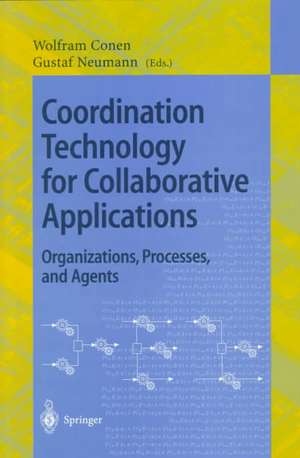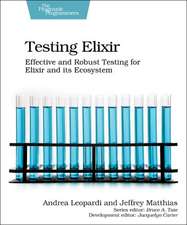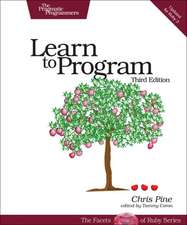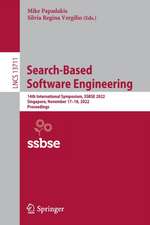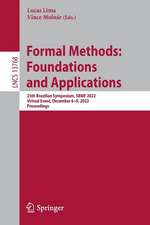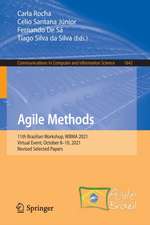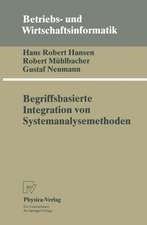Coordination Technology for Collaborative Applications: Organizations, Processes, and Agents: Lecture Notes in Computer Science, cartea 1364
Editat de Wolfram Conen, Gustaf Neumannen Limba Engleză Paperback – 18 feb 1998
This carefully arranged book concentrates on the relationships between coordination technology and business application requirements and introduces general elements of a cooperative infrastructure allowing for the construction of collaborative applications. It is essential reading for research and development professionals active in the area as well as for IT managers interested in applying this promising new technology in order to remain competitive in the future.
Din seria Lecture Notes in Computer Science
- 20%
 Preț: 1061.55 lei
Preț: 1061.55 lei - 20%
 Preț: 307.71 lei
Preț: 307.71 lei - 20%
 Preț: 438.69 lei
Preț: 438.69 lei - 20%
 Preț: 579.30 lei
Preț: 579.30 lei -
 Preț: 410.88 lei
Preț: 410.88 lei - 17%
 Preț: 427.22 lei
Preț: 427.22 lei - 20%
 Preț: 596.46 lei
Preț: 596.46 lei - 15%
 Preț: 448.04 lei
Preț: 448.04 lei - 20%
 Preț: 353.50 lei
Preț: 353.50 lei -
 Preț: 389.49 lei
Preț: 389.49 lei - 20%
 Preț: 309.90 lei
Preț: 309.90 lei - 20%
 Preț: 645.28 lei
Preț: 645.28 lei - 20%
 Preț: 763.23 lei
Preț: 763.23 lei - 15%
 Preț: 580.46 lei
Preț: 580.46 lei - 20%
 Preț: 310.28 lei
Preț: 310.28 lei - 20%
 Preț: 655.02 lei
Preț: 655.02 lei - 20%
 Preț: 1183.14 lei
Preț: 1183.14 lei - 20%
 Preț: 340.32 lei
Preț: 340.32 lei -
 Preț: 449.57 lei
Preț: 449.57 lei - 20%
 Preț: 591.51 lei
Preț: 591.51 lei - 18%
 Preț: 938.83 lei
Preț: 938.83 lei - 20%
 Preț: 337.00 lei
Preț: 337.00 lei - 20%
 Preț: 649.50 lei
Preț: 649.50 lei - 20%
 Preț: 607.40 lei
Preț: 607.40 lei - 20%
 Preț: 1414.79 lei
Preț: 1414.79 lei - 20%
 Preț: 1024.44 lei
Preț: 1024.44 lei - 20%
 Preț: 583.40 lei
Preț: 583.40 lei - 20%
 Preț: 453.32 lei
Preț: 453.32 lei - 20%
 Preț: 575.49 lei
Preț: 575.49 lei - 20%
 Preț: 1075.26 lei
Preț: 1075.26 lei - 20%
 Preț: 585.88 lei
Preț: 585.88 lei - 20%
 Preț: 825.93 lei
Preț: 825.93 lei - 17%
 Preț: 360.20 lei
Preț: 360.20 lei - 20%
 Preț: 763.23 lei
Preț: 763.23 lei - 20%
 Preț: 340.32 lei
Preț: 340.32 lei - 20%
 Preț: 504.58 lei
Preț: 504.58 lei - 20%
 Preț: 369.13 lei
Preț: 369.13 lei - 20%
 Preț: 580.93 lei
Preț: 580.93 lei - 20%
 Preț: 343.62 lei
Preț: 343.62 lei - 20%
 Preț: 350.21 lei
Preț: 350.21 lei - 20%
 Preț: 583.40 lei
Preț: 583.40 lei - 20%
 Preț: 583.40 lei
Preț: 583.40 lei - 15%
 Preț: 438.59 lei
Preț: 438.59 lei - 20%
 Preț: 341.95 lei
Preț: 341.95 lei - 20%
 Preț: 238.01 lei
Preț: 238.01 lei - 20%
 Preț: 538.30 lei
Preț: 538.30 lei
Preț: 332.57 lei
Preț vechi: 415.71 lei
-20% Nou
Puncte Express: 499
Preț estimativ în valută:
63.65€ • 66.20$ • 52.54£
63.65€ • 66.20$ • 52.54£
Carte tipărită la comandă
Livrare economică 15-29 aprilie
Preluare comenzi: 021 569.72.76
Specificații
ISBN-13: 9783540641704
ISBN-10: 354064170X
Pagini: 296
Ilustrații: XII, 356 p.
Dimensiuni: 155 x 235 x 16 mm
Greutate: 0.42 kg
Ediția:1998
Editura: Springer Berlin, Heidelberg
Colecția Springer
Seria Lecture Notes in Computer Science
Locul publicării:Berlin, Heidelberg, Germany
ISBN-10: 354064170X
Pagini: 296
Ilustrații: XII, 356 p.
Dimensiuni: 155 x 235 x 16 mm
Greutate: 0.42 kg
Ediția:1998
Editura: Springer Berlin, Heidelberg
Colecția Springer
Seria Lecture Notes in Computer Science
Locul publicării:Berlin, Heidelberg, Germany
Public țintă
ResearchCuprins
A perspective on technology-assisted collaboration.- Coordination in knowledge-intensive organizations.- Co-ordination of management activities — Mapping organisational structure to the decision structure.- A cooperative approach to distributed applications engineering.- Towards logic programming based coordination in virtual worlds.- Enhancement of creative aspects of a daily conversation with a topic development agent.- Coordinating human and computer agents.- Coordination in workflow management systems — A rule-based approach.- A framework and mathematical model for collaboration technology.- Practical experiences and requirements on workflow.- Coordination science: Challenges and directions.- Supporting autonomous work and reintegration in collaborative systems.- Workspace awareness for distributed teams.- GeM and WeBUSE: Towards a WWW-database interface.- Post-client/server coordination tools.- An experimental delay analysis for local audio video streams for desktop collaborations.- Supporting both client-server and peer-to-peer models in a framework of a distributed object management system.
Caracteristici
This book concentrates on the relationship between coordination technology and business application requirements. It is essential reading for research and development professionals active in the area as well as for IT managers interested in applying this promising new technology to remain competitive in the future.
